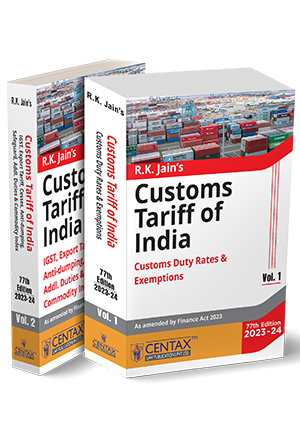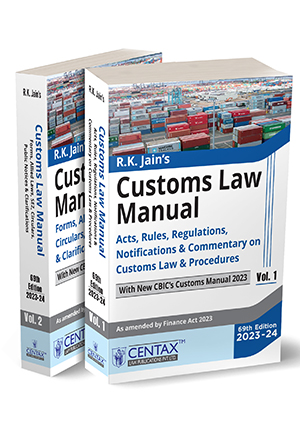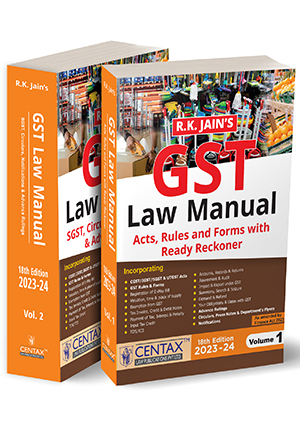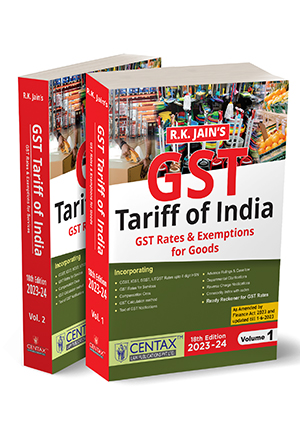[Opinion] Ambiguity Over ‘Place of Supply’ of Services of Transportation of Goods in Cases Where the Supplier or Recipient of Services is Outside India
- Blog|News|GST & Customs|
- 2 Min Read
- By Taxmann
- |
- Last Updated on 26 October, 2023

Ajay K Chhabra & Pushpa Puthran – [2023] 155 taxmann.com 484 (Article)
The Goods and Services Tax Council (‘GST Council’) is a platform where both Central and state governments can collaborate and make effective decisions on multiple GST aspects. Over the past six years, the GST Council has been deliberating on various issues and disparities caused by the amalgamation of various erstwhile tax laws, including issues raised via industry representations. Efforts are also being made to streamline the provisions to bring parity among businesses and simultaneously protect the interests of the Revenue. The decisions taken are implemented and clarified by way of amendments, notifications, circulars etc. However, sometimes the amendments do not yield intended results prompting more clarity to remove the ambiguity and to implement what tax authorities originally intended while attempting to change the law. Recently, at its 49th meeting held on 18 February 2023, the GST Council recommended to rationalise the provision of place of supply for services of transportation of goods by deletion of section 13(9) of IGST Act, 2017, so as to provide that the place of supply of services of transportation of goods, in cases where location of supplier of services or location of recipient of services is outside India, shall be the location of the recipient of services.
Background
Based on the representation filed by Indian National Shipowners’ Association (INSA), and with an intention to bring ISL and FSL at par with regards to GST taxability on goods transportation services through vessel, from Customs station of clearance in India to a place outside India and vice versa, the GST Council has proposed to delete sub-section 9 of Section 13 of IGST Act (deleted w.e.f. 1 October 2023) and to provide the PoS of said services as the location of the recipient.
The export ocean freight charged by Indian shipping lines (ISL) to Indian exporter was taxable, since location of ISL and recipient of services was in India, whereas the same freight charged by foreign shipping lines (FSL), not registered in India, was not getting taxed in India since location of FSL and PoS (destination of goods) was outside India and did not qualify as import of service in the hands of Indian exporter. Thus, Indian exporters were preferring FSL over ISL. Similar disparity existed in the case of import ocean freight service supplied to foreign consignors. ISL charge GST on services supplied by them to foreign consignors, while FSL do not have to, as location of FSL and the recipient of the services is outside India; therefore, foreign consignors prefer to award contracts to FSLs.
Also, it is important to note that, prior to deletion of Section 13(9), freight services provided by ISL to foreign exporters in relation to import shipment was defeating the principal of consumption-based taxation, and deletion of Section 13(9) and qualifying the same under default rule of Section 13(2) of IGST Act, would adhere to the scheme of consumption-based GST.
Click Here To Read The Full Article
Disclaimer: The content/information published on the website is only for general information of the user and shall not be construed as legal advice. While the Taxmann has exercised reasonable efforts to ensure the veracity of information/content published, Taxmann shall be under no liability in any manner whatsoever for incorrect information, if any.

Taxmann Publications has a dedicated in-house Research & Editorial Team. This team consists of a team of Chartered Accountants, Company Secretaries, and Lawyers. This team works under the guidance and supervision of editor-in-chief Mr Rakesh Bhargava.
The Research and Editorial Team is responsible for developing reliable and accurate content for the readers. The team follows the six-sigma approach to achieve the benchmark of zero error in its publications and research platforms. The team ensures that the following publication guidelines are thoroughly followed while developing the content:
- The statutory material is obtained only from the authorized and reliable sources
- All the latest developments in the judicial and legislative fields are covered
- Prepare the analytical write-ups on current, controversial, and important issues to help the readers to understand the concept and its implications
- Every content published by Taxmann is complete, accurate and lucid
- All evidence-based statements are supported with proper reference to Section, Circular No., Notification No. or citations
- The golden rules of grammar, style and consistency are thoroughly followed
- Font and size that’s easy to read and remain consistent across all imprint and digital publications are applied





